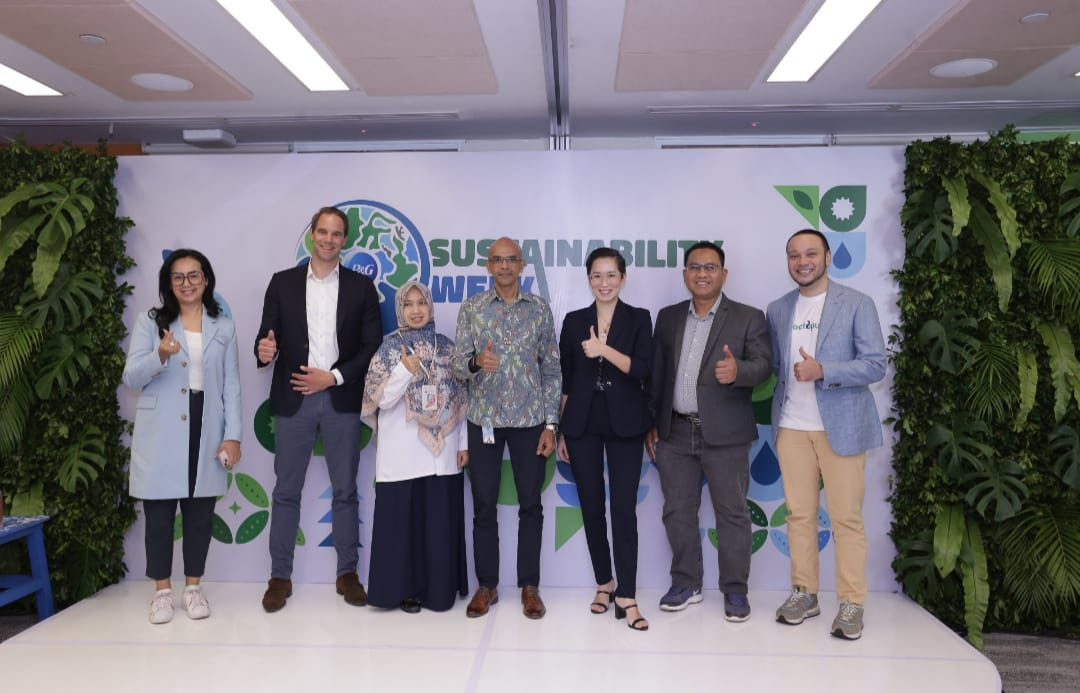Popular Reads
Top Results
Can't find what you're looking for?
View all search resultsPopular Reads
Top Results
Can't find what you're looking for?
View all search resultsP&G expands Conscious Living program to Jakarta to resolve plastic waste issue
To help handle plastic waste, one of the pressing environmental issues in cities around Indonesia, fast-moving consumer goods company Procter & Gamble (P&G) Indonesia has expanded its Conscious Living program to Jakarta following the success of the program in Bandung.
Change text size
Gift Premium Articles
to Anyone
T
o help handle plastic waste, one of the pressing environmental issues in cities around Indonesia, fast-moving consumer goods company Procter & Gamble (P&G) Indonesia has expanded its Conscious Living program to Jakarta following the success of the program in Bandung by teaming up with retail supermarket Super Indo.
P&G Indonesia Sales senior director and Sustainability leader Asrini Suhita said the company started to implement the Conscious Living program in collaboration with Super Indo in Bandung in 2022. “Learning from the successful collaboration, we agreed to expand the program to Jakarta this year,” she said during a sustainability talk show, part of a series of programs under Sustainability Week at the company’s office in Jakarta on May 16.
The Conscious Living program aims to preserve the environment by preventing sachets or multilayer and high-density polyethylene (HDPE) waste from ending up in landfill and “this way, we implement zero waste-to-landfill principle,” said Asrini.
Asrini pointed out that the Conscious Living program was first launched in West Java in 2021, in collaboration with Octopus, a circular economy platform that that allows consumers to sort trash and report it through the Octopus application, after which trash collectors pick it up.
The program was initially conducted internally, but the high enthusiasm shown by employees prompted the company to also involve its consumers and communities, according Asrini.
Under the program, P&G consumers or the general public can collect and submit trash, particularly sachets and HDPE plastic stemming from the company’s products.
“The more parties from the communities involved, the better,” she said, referring to the sustainability movement.
All should be based on the assistance of relevant parties, especially consumers that play a crucial role in the program. She also ensured that the presence of the application would become available in Bandung, Gianyar, Denpasar and Makassar.
“P&G consumers who submit sachet or HDPE plastic waste will get incentives in the form of points, which can be collected and exchanged for phone credit, electricity tokens, coffee vouchers and other attractive incentives,” she said.
To date, the program has involved 8,000 consumers and 8,000 trash collectors. “Of the 8,000 trash collectors, 70 percent, 5,600, are women. About 1,000 disabled people are also involved in the program,” she disclosed.
“We have collected about 200 tonnes of plastic waste,” she said.
Under the Conscious Living program, the collected valueless plastic waste is processed and recycled to be converted into valuable goods, contributing to realizing the 3Rs (reduce, reuse and recycle) principle.
The sustainability talk show also revealed how collaboration involving multiple parties was increasingly needed to allow for better solutions to plastic waste in cities in Indonesia.
Moehammad Ichsan, cofounder and CEO of Octopus Indonesia expressed his delight at collaborating with other parties under the Conscious Living program. “This can help solve the lingering unresolved waste issue,” he said.
HDPE plastic that has no economic value can be converted into goods that have economic added value, so the benefits involve all parties, including consumers, conservationists and trash collectors, according to Ichsan.
Meanwhile, P&G Indonesia president director said earlier the overall environmental sustainability initiatives that P&G was taking were aligned with the company’s mission regarding Force for Growth and Force for Good.
“We ensure that every business activity that we conduct considers environmental sustainability aspects, starting from the production process and product supply chain to packaging after being in use by consumers. We are holding the first edition of Sustainability Week in order to rebuild the spirit and understanding internally, and for the public, to take concrete actions in sustaining sustainability,” he said.
Jakarta Environment Agency head Asep Kuswanto expressed his appreciation and support for P&G for consistently implementing sustainability program, especially in sustainable trash management “through a circular economy in which P&G Indonesia is also in line with our endeavor to achieve zero waste and emissions,” he said.
Super Indo brand president Boudewijn van Nieuwenhuijen pointed out that the Sustainability Week that P&G Indonesia was conducting was in line with Super Indo’s ambition in terms of waste treatment, notably zero waste-to-landfill.
“We embody good collaboration through the Conscious City program in Bandung and Jakarta,” he said.
Under the Conscious City program, trash is sorted and plastic waste is exchanged. “We believe that this will contribute to increasing the plastic waste [that is] collected and recycled in these two cities,” he said.
“Furthermore, the collaborative program involving Super Indo, P&G and Octopus can encourage the creation of circular economy in which trash collectors are empowered,” he said.










